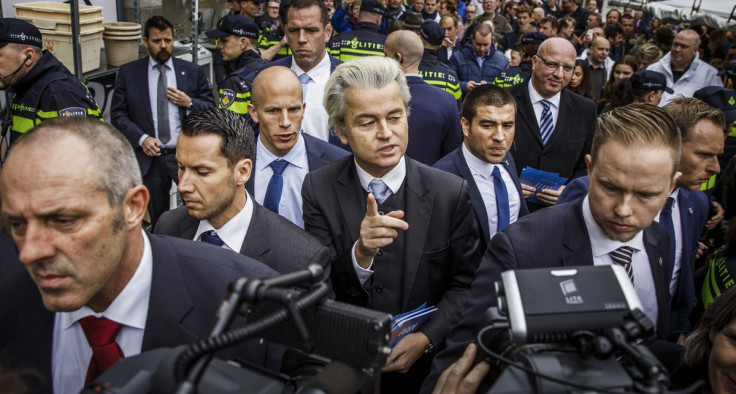Anti-Islam politician Geert Wilders found guilty of inciting discrimination in hate speech trial
Wilders was accused of inciting hatred against people of Moroccan origin.

Far-right politician Geert Wilders was found "guilty of inciting discrimination" in the trial meant to determine whether asking people if they wanted more or fewer Moroccans in the Netherlands amounted to inciting hatred.
The judges said he was guilty of insulting and discriminating against a group of people, contributing to polarise society. Introducing the ruling, judge Hendrik Steenhuis said: "Freedom of speech is fundamental in society. It can hurt and shock sometimes, but there are limitations."
The judges however said there would be no fine against Wilders. Prosecutors had asked for €5,000 (£4,250) in compensation.
The judges had to evaluate whether Wilders' use of the term "Moroccan" was meant as discriminating against an ethnicity, and whether the politician knew what the consequences of his speech would be.
The leader of the Freedom Party (PVV) had told the court in his defence speech he rejected accusations of racism. He said that "Moroccans are not a race", defending his right of freedom of speech as the "only freedom he has" since living under police protection.
The judges however found he used the word "Moroccan" to refer to an ethnic group, not as a group of citizens, and that Wilders was aware of the attention his statements would attract.
Wilders was not present in court. He reacted on Twitter: "Three PVV-hating judges declare that Moroccans are a race and convict me and half of the Netherlands. Madness."
Three PVV hating judges declare that Moroccans are a race and convict me and half of the Netherlands.
— Geert Wilders (@geertwilderspvv) December 9, 2016
Madness.
He previously denounced the trial as political and, ahead of the ruling, he said: "Whatever the verdict, I will continue to speak the truth about the Moroccan problem, and no judge, politician or terrorist will stop me."
Ever since creating the PVV as a breakaway party from the mainstream centre-right VVD in 2006, Wilders has built his political career on the idea that the Netherlands, a country of 16 million people of which only 5% identify as Muslim, was threatened by foreign influences, specifically the religion of Islam.
He also often points to crime statistics showing that people of Moroccan background tend to constitute a significant part of the prison population in the Netherlands, ignoring however that more than 36% the prison population is ethnically Dutch, compared to 10.8% of Moroccan descendant.
The incriminating remarks about Moroccan people and Dutch people of Moroccan origin were part of his inflammatory campaign against what he calls the "Islamification of the Netherlands."
In a rally held in the Dutch capital of The Hague on 19 March 2014, he asked people if they wanted more or fewer Moroccans in the country, and, after the crowds responded "fewer", he added "We're going to arrange that".
The rally sparked a wave of complaints (precisely 6,474) accusing Wilders of inciting hatred and discrimination. Goran Sluiter, a lawyer representing the people who are demanding compensation from Wilders, told the judges "that only the law can protect minorities" in the Netherlands from "an evil that is called discrimination".
Should Wilders decide to appeal, the process would likely last throughout the parliamentary election campaign, which runs for six weeks before voting on March 15. Wilders' party is leading in the polls ahead of the general election. According to Dutch political expert Eddy Habben Jansen, director of the think tank ProDemos, Wilders will use the verdict in the campaign, but that is unlikely to shift support for him significantly.
"Wilders has been around for quite some time, more than 10 years now. His position on freedom of speech and migrants in society have been clear for years," he told IBTimes UK. "According to opinion polls his support is already substantial, but there have been a lot of fluctuations and I would not make any predictions on the election based on the opinion polls," he added.
The Dutch media commented that no matter the verdict in the hate speech trial, the politician can claim a victory, as his views have once again conquering the spotlight and winning attention even before the electoral campaign begins.
Wilders seemingly agreed with the point, sharing on Twitter the front pages of the main Dutch newspapers on 9 December, all prominently featuring his photograph.
Tsja... pic.twitter.com/eV9rfWBrXr
— Geert Wilders (@geertwilderspvv) December 9, 2016
Over the summer, Wilders attended the Republican party convention in the US, and has adapted Donald Trump's slogan of "making America great again" to the Netherlands. Like Trump, he uses social media as a platform to convey his message, in more or less lyrical forms, and often in English to maximise his reach.
Islamic immigration
— Geert Wilders (@geertwilderspvv) December 7, 2016
Is an invasion
An existential problem
That will replace our people
Erase our culture
End our freedom
STOP IT NOW
In the Netherlands, a country that prides itself on tolerance and coexistence of different lifestyles, episodes of anti-Muslim discrimination are dramatically increasing.
Data presented by the Dutch police showed that the 439 incidents recorded in 2015 more than doubled those of the previous year. Muslim women and men who wear clearly recognisable Muslim clothing such as headscarves are particularly targeted in Islamophobic attacks.
© Copyright IBTimes 2025. All rights reserved.






















